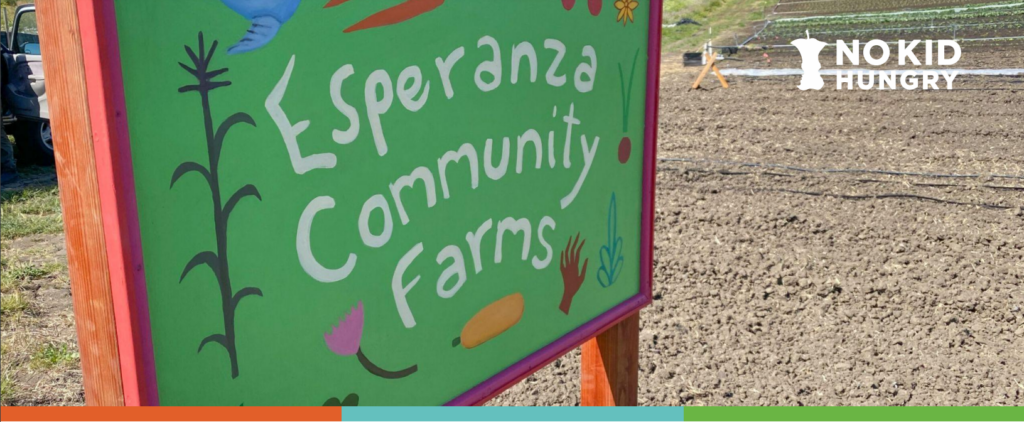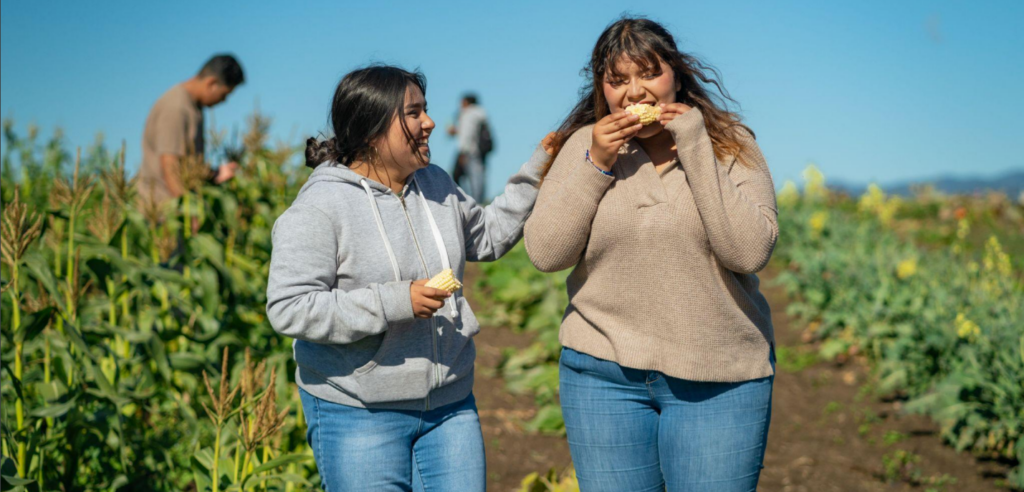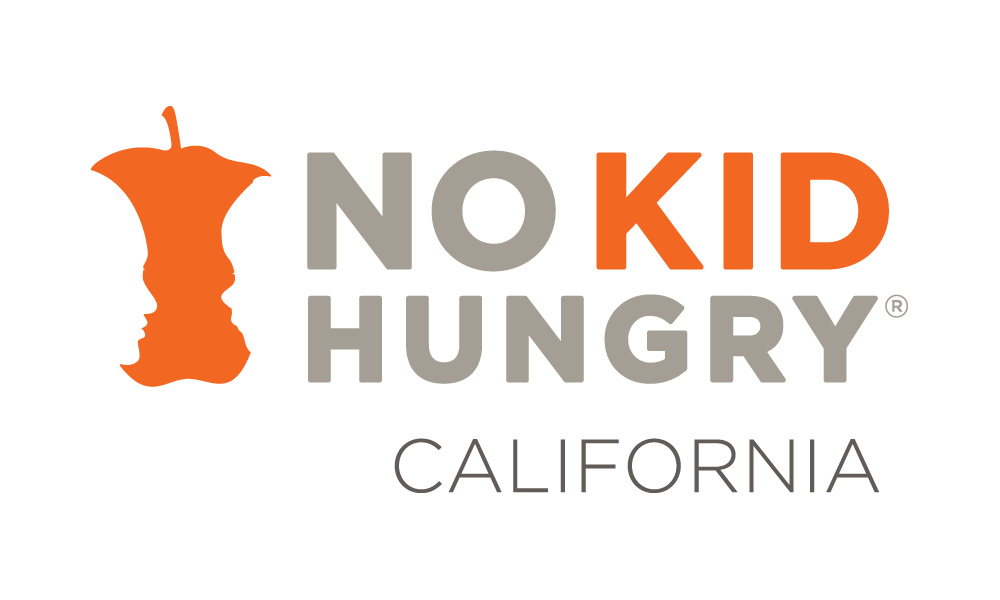
Spotlight on Equity: Esperanza Farms
“Esperanza Community Farms, promoting healthy eating and deepening the roots of economic justice in the Pajaro Valley.” – ECF esperanzacommunityfarms.org
We recently spoke with Mireya Gomez-Contreras Co-Lider (co-leader) at Esperanza Community Farms (ECF). She is an activist, farmer, mother, leader, storyteller, and more. Along with Guillermo Lazaro (Co-leader) and the team of diverse community members (Latino/Mexican immigrants, students, activist, community members in Pajaro and Salinas Valleys, and others), they are making a positive impact through their food justice efforts.
The People
ECF members are a unique group of farmers, students, and activists interested in changing the world. With intentions to end world hunger- they start by focusing on the land- on an organic farm; where the natural world is ever-present. ECF members learn from nature and share in the bountiful produce they receive from their labor.
They work at creating a healthy, localized food system based on food sovereignty. Which is the belief that people have a right to healthy and culturally appropriate food produced through ecologically sound and sustainable methods; they believe in working with dignity and stewardship of the environment where they define their own food and agriculture systems. (1)
Click here to learn more about how they began and their vision for this project.
Foundations for Systems Change
They understand the hard truth, that changing the world they live in means changing systems of oppression. This means the foundational work within an organization must reflect the changes they wish to see in their community. ECF members are intentional about how they affect their communities; they are purposeful in their vision of what equity means and how to implement practices with the potential to make it possible and sustainable. They do this
through:
Language– being deliberate about how they speak, which language they speak, and understanding culture and thinking about how to make their words and ways relatable to diverse groups of individuals. Members choose to speak Spanish, the primary language there.
Alliances– this includes deciding who to partner with and who not to partner with. They are thoughtful about who they invite into the core team and who is not invited due to alignment and intentions. They value diversity; they bring all members of the community together to talk authentically about their lives and to work together to find solutions to problems they are facing.
Translation– they are aware of the importance of translating not just language, but also translating cultures. For example, they understood the need to hire a young person to work with the youth from the local high school. When talking to elected officials they have a member on their team with expertise in this area who can speak in that language/culture.
Determination and Intentional Pacing– they are determined, they plan and work with a sense of urgency and creativity that fuels every decision. For example, they decide which directions to grow in and at what pace. They were intentional about starting small and scaled up slowly and naturally. They have been diligent and patient.
“One of our operating principles is about accepting that the people closest to the problem, know the solution.” -Mireya Gomez-Contreras

Farm 2 Cafeteria Project
ECFs have partnered with a local high school to bring their goal of increasing youth access to organic produce to life.
This collaboration began with visits from students at the local high school (Pajaro Valley High School/PV) to the farm. After visiting ECF the students were excited and wanted to bring produce to their schools.
Mireya calls this “the joy of learning with our entire being, gardening. This joy of learning and growing food is universal and so many of us yearn for it.”
Since that first visit, this student led initiative has been successful in bringing over 400 salads to summer school students at PV in 2022.
Their dream includes a vision where every school in their district has a salad bar; they might not stop until they get there. They hired a recent PV graduate, Alma Leonor-Sanchez, to manage the Farm 2 Cafeteria program; she is 19 and on fire. Alma runs things differently, compared to Mireya and Guillermo, which is why they hired her. They trust that she understands her peer group and their needs. Alma brings her unique talents to this work.
Click on Farm 2 Cafeteria project to learn more.
Part of being equitable is allowing people to be individuals and to do things in ways that may not align with the status quo but are effective in creating long-term sustainable change.

Levels of Oppression and Change
They also use the four levels of oppression and change as a tool to guide their understanding of the work. This tool reminds them that there are levels of change that need to happen. 1. One level is our personal work of critically reflecting on our own values, beliefs and biases to eliminate oppressive practices and systems. 2. The interpersonal work must be done with other people. For example by building relationships with students and creating an ambassador network, they have learned more about these partners and have increased their reach due to the trust built through these connections. Students have committed to the vision of creating more access to fresh produce and they share this at high school rallies, by offering taste testing, by having options for students such as choosing their salad dressings, and by using hip colors in their promotion of the salads; they are building a toolkit of communication strategies that are informing the team to think deeply about what could be missing. This can lead to the third level which is an Institutional level where systems and processes can change over time within organizations. 4. The last level is cultural. For example, there is a “Cheetos culture” among many youths that is easy to misunderstand. It can benefit us all if we pause and analyze this and ask students to help us understand this practice. This is the level of oppression change that takes the longest and takes a lot of systems change to make permanent.
Parting Thoughts
As the storyteller in their collective Mireya shared how each member is like a puzzle piece in which they are all needed, they are unique, yet they fit together, and where one starts the other picks up. For example, one member is uniquely qualified to talk to the cafeteria manager while Mireya with her talents may meet with an administrator about growing the program and scaling up. They are skilled at matching the people on their team to those on their partner teams to speak the right language to each other.
“This work takes time and trust, we have to trust people and be really confident in that what we are doing is going to work.” Mireya Gomez-Contreras
References:
1. US Food Sovereignty Alliance (2023). Food sovereignty. Retrieved from http://usfoodsovereigntyalliance.org/what-is-food-sovereignty/
Last Reviewed: September 14, 2023



